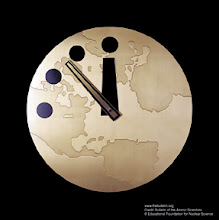An Appeal for Secularism
"I am the Lord thy God, thou shall have no other Gods before me."
It seems that in the past two decades, the secular nature of Government has been threatened by groups such as the Moral Majority, the Christian Coalition; groups whose sole purpose is to expand the influence of religion (particularly Evangelical Christianity) in Government. I hope to show that this is a bad development, not just for those who doubt (as I do) Christian belief, but for the very same people who so passionately believe, they have seen fit to try to legislate Christian tenets. This essay is an attempt not just to show how dangerous governing by religious tenets is for atheists and agnostics but also to show how silly it is for those same groups that now favor it, to try to press the point.
First off, the words "secular" and "secularization" have become dirty words in American politics, which is a terrible development for the country. It has been the standing policy of the Christian Right to confuse "secular" with "atheist," and to confuse a nation where personal beliefs are just that with a country that seeks to abolish beliefs. Indeed, over the twenty-year history of the Christian Right, it has continually assumed that those who believe that Christian values have no more place in governance than personal preference for milk in coffee, or toast with breakfast, are in fact seeking the total destruction of belief in the nation. They confuse we who believe in a secular nation with the French Radicals of the 1790's. They think our first step was to keep prayer out of the classroom; the next will be the guillotine for priests and the confiscation by the state of church property. This, really, is quite silly. Secularists do not believe that faith is a crime; we do not believe that religion is evil. We do take offense, though, at the idea that the God you pray to can tell us how to live; we take offense that our local police, by the FBI, may enforce the tenets you believe. The word "secular" does not imply lack of faith; it implies that whom we pray to is our own business, the morals we live by are of our own choosing, and that so long as we do not interfere with your pursuit of wealth, happiness or safety, you should not interfere with ours.
The word "secular" should be embraced then, not just in the politics of the Nation, but also by those who earnestly believe. A secular nation offers its believers a profound service: it makes belief a choice, and not a requirement, and because belief is a choice, it is enriched. Imagine a country where the foremost law is the Ten Commandments. Imagine a country that enforces the first Commandment as it would the traffic and tax laws. Is belief better off as a requirement for the full benefits of citizenship, or is it more enriched when individuals come to it on their own, through their own choices? Belief is cheapened when it is mandatory.
For the most part, I have been discussing religion in the public sphere in vagaries and hypotheticals; let us look at one particular religious question that we are debating hotly across the nation right now: gay marriage. Advocates for constitutional amendments at the state and national level are addicted to bringing God into this debate, probably because belief is the only way they have to cover their prejudice. So why is it so important for a Christian to oppose Gay marriage? The only answer I can come up with is that Christians must believe that they will be punished for the actions of others in their congressional district, that because they live in San Francisco, and the city married some 3,000 gay couples, everyone who voted in the Mayoral race in San Francisco is culpable. How culpable in this Christian system is the individual for another's actions? Does someone committing incest or polygamy in Utah despite my objections still land me in Purgatory, or Hell? Can an abortion down the street damn me? If I have never committed adultery, but I do live in a country where it is legal, am I still culpable? I would say that this is flawed reasoning at best and that the only clear direction for the confused Christian is to remember God's answer from the whirlwind, in the Book of Job: "Where were you when I laid the foundations of the Earth?" That is, who are you to assume knowledge of God's system of judgment?
It seems to me that the only just God would be one who holds individuals responsible for their own actions, a God who tells you that vengeance and judgment are his to deal out, not yours. I think it is proper here to remind you just how hard it is to lead a just and moral life, how hard it is to do the right thing, without being responsible for your neighbor.


0 Comments:
Post a Comment
<< Home